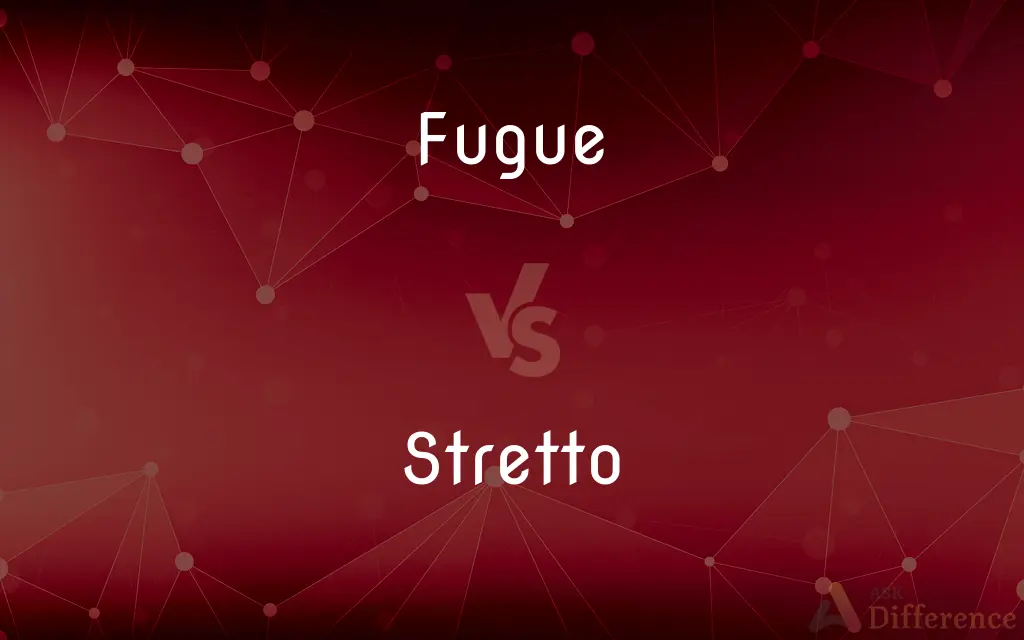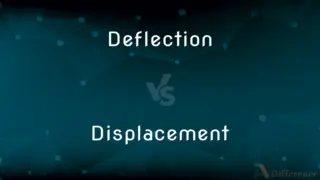Fugue vs. Stretto — What's the Difference?

Difference Between Fugue and Stretto
ADVERTISEMENT
Compare with Definitions
Fugue
In music, a fugue () is a contrapuntal compositional technique in two or more voices, built on a subject (a musical theme) that is introduced at the beginning in imitation (repetition at different pitches) and which recurs frequently in the course of the composition. It is not to be confused with a fuguing tune, which is a style of song popularized by and mostly limited to early American (i.e.
Stretto
In music, the Italian term stretto [ˈstretto] (plural: stretti) has two distinct meanings: In a fugue, stretto (German: Engführung) is the imitation of the subject in close succession, so that the answer enters before the subject is completed. In non-fugal compositions, a stretto (also sometimes spelled stretta) is a passage, often at the end of an aria or movement, in faster tempo.
Fugue
(Music) A contrapuntal musical composition whose basic structure consists of a theme or themes stated successively in different voices.
Stretto
A close succession or overlapping of statements of the subject in a fugue, especially in the final section.
Fugue
(Psychiatry) A dissociative state, usually caused by trauma, marked by sudden travel or wandering away from home and an inability to remember one's past.
ADVERTISEMENT
Stretto
A final section, as of an opera, performed with an acceleration in tempo to produce a climax. Also called stretta.
Fugue
(music) A contrapuntal piece of music wherein a particular melody is played in a number of voices, each voice introduced in turn by playing the melody.
Stretto
(music) The presence of two close or overlapping statements of the subject of a fugue, especially towards the end.
Fugue
Anything in literature, poetry, film, painting, etc., that resembles a fugue in structure or in its elaborate complexity and formality.
Stretto
(music) An acceleration in the tempo of an opera that produces an ending climax.
Fugue
A fugue state.
Stretto
(music) With gradually increasing speed.
Fugue
To improvise, in singing, by introducing vocal ornamentation to fill gaps etc.
Stretto
(music) Having gradually increasing speed.
Fugue
A polyphonic composition, developed from a given theme or themes, according to strict contrapuntal rules. The theme is first given out by one voice or part, and then, while that pursues its way, it is repeated by another at the interval of a fifth or fourth, and so on, until all the parts have answered one by one, continuing their several melodies and interweaving them in one complex progressive whole, in which the theme is often lost and reappears.
All parts of the scheme are eternally chasing each other, like the parts of a fugue.
Stretto
The crowding of answer upon subject near the end of a fugue.
Fugue
Dissociative disorder in which a person forgets who who they are and leaves home to creates a new life; during the fugue there is no memory of the former life; after recovering there is no memory for events during the dissociative state
Fugue
A dreamlike state of altered consciousness that may last for hours or days
Fugue
A musical form consisting of a theme repeated a fifth above or a fourth below its first statement
Share Your Discovery

Previous Comparison
Ambivalent vs. Nonchalant
Next Comparison
Deflection vs. Displacement













































